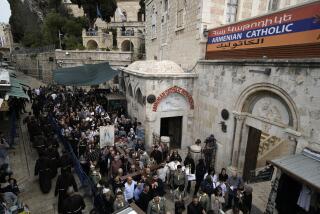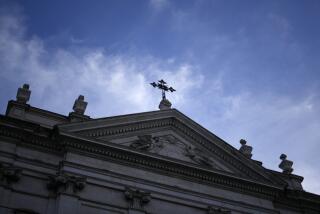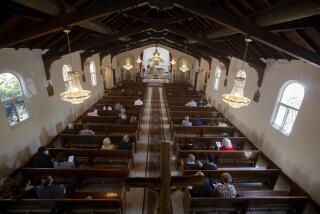Iraqi Christians displaced by Sunni militants seek to flee abroad
Word that their hometown may soon be “liberated” has done little to buoy the spirits of the displaced residents of Bartella, a largely Christian town in northern Iraq of 20,000 overrun last month by Islamist militants.
There is no sense of heady anticipation from the exiled townsfolk and tens of thousands of other Christians who have fled the onslaught of Islamic State extremists.
------------
FOR THE RECORD
An earlier version of this post misspelled the name of Father Banham Lalo, pastor of Bartella’s St. George Church, as Bahnam.
------------
Many displaced Christians now see no future in Iraq, home to one of the most ancient Christian communities anywhere.
“Now we know there is no more security in this country,” said Father Bahnam Lalo, pastor of Bartella’s St. George Church, who, like most of his parishioners, fled to Irbil, capital of the relatively safe semiautonomous Kurdish region. “We love this land, we’re rooted to this land, but it’s hopeless.”
International attention last month focused on the plight of the Yazidis, another minority group, and their harrowing escape to Mt. Sinjar. But about 100,000 Christians also have fled the Sunni militants since June, church leaders say.
Multitudes of displaced Christians are now hoping to join relatives in Europe, the United States, Australia and elsewhere. Many have had enough after more than a decade of sectarian-fueled conflict that followed the U.S.-led invasion of Iraq, during which Christians have become an ever-more vulnerable minority. They would rather contemplate immigration, despite its many challenges, including the often extreme difficulty of acquiring visas, and the risks of enlisting the services of human smugglers.
“Even if Bartella is liberated, people will go back for a short time, get their affairs in order, and leave,” predicted Father Lalo, speaking from a shack serving as a makeshift office for the displaced in Irbil.
For weeks before the Islamic State takeover, the atmosphere had been tense in Bartella, about 10 miles east of Mosul, the largest city in northern Iraq that was overrun in June.
By early August, the militants were on the march again, fanning out from Mosul across the Nineveh plains, long home to people of disparate creeds and ethnic origins.
Frantic reports reached Bartella that residents risked being beheaded if they did not convert to Islam. Women were in danger of being sold as sex slaves.
Defending Bartella was a combined force of Iraqi Kurdish fighters known as peshmerga and members of the Hirasaat (“guardian” in Arabic), a makeshift volunteer Christian militia. The peshmerga had arrived in June, after the Iraqi army withdrew, and vowed to defend Bartella.
Yet in the predawn hours of Aug. 8, the peshmerga received orders to withdraw, according to a Hirasaat volunteer who was stationed at a checkpoint near the main highway to Mosul.
“The peshmerga commander turned to me at 2 a.m. and said they were leaving the area and advised me to do the same,” said the ex-militiaman, who spoke anonymously for his personal security. “He said, ‘You can stay and fight if you want, but we’re leaving!’ ”
Bartella soon lost most of its defenders as Islamic State fighters closed in.
“What could we do? Was I supposed to fight … with a rusty Kalashnikov?” asked the former militiaman, raising his hands in frustration. “I hadn’t fired it in four years.... I didn’t even know if it would fire.”
By 10 a.m, Bartella had fallen. Most residents escaped to the relative safety of Irbil or Dahuk, also in semiautonomous Kurdistan. Four or five Christians, too old or infirm to move, have remained behind.
In Irbil, those who couldn’t find housing with relatives or friends made their way to courtyards of churches in the city’s Christian neighborhood, Ainkawa. They took shelter in tents hastily set up by aid organizations and church administrators.
Others sought refuge in the half-built shell of a multistory construction site on Ainkawa’s main thoroughfare, across the street from the Church of St. Joseph. They crammed themselves, two families or more, into drab concrete rooms reminiscent of prison cells, a tarpaulin on the floor and another spread across the “entrance,” the only concession to comfort and privacy.
Mufreed Said came to Irbil with his wife, two children and brother and occupied a space in the musty basement level of the unfinished building. On a recent evening, the brothers, heavy-set men with permanent scowls occasionally broken by an acerbic chuckle, squatted on the floor in a circle with some of their Bartella neighbors.
They exchanged rumors, bits of information gleaned from social media and hasty calls with those left behind. One man wondered whether his new house was now occupied by an Islamic State fighter. Said expressed hope that a Muslim neighbor still in Bartella had managed to go into his house and salvage the family’s framed wedding photos.
All agreed on one thing, as they sat in safety in Kurdistan: The Kurdish fighting forces had abandoned them.
“The peshmerga didn’t even tell us to run away,” Said explained, his voice rising in anger. “It was my friend in the local defense force who told me to leave my home after the peshmerga had already left.”
For Said and his family, it no longer mattered that Kurdish and Iraqi forces, aided by U.S. air power, might soon recapture Bartella. He has already made his decision: He and his family will leave Iraq.
“Even if you put all of Iraq in my name, I won’t come back,” Said declared. “I would rather sleep on the streets in Lebanon than come back here.”
Two days later, Said was no longer answering his Iraqi cellphone. He and his family had left Iraq.
Bulos is a special correspondent. Times staff writer Patrick J. McDonnell in Beirut contributed to this report.
More to Read
Start your day right
Sign up for Essential California for news, features and recommendations from the L.A. Times and beyond in your inbox six days a week.
You may occasionally receive promotional content from the Los Angeles Times.







